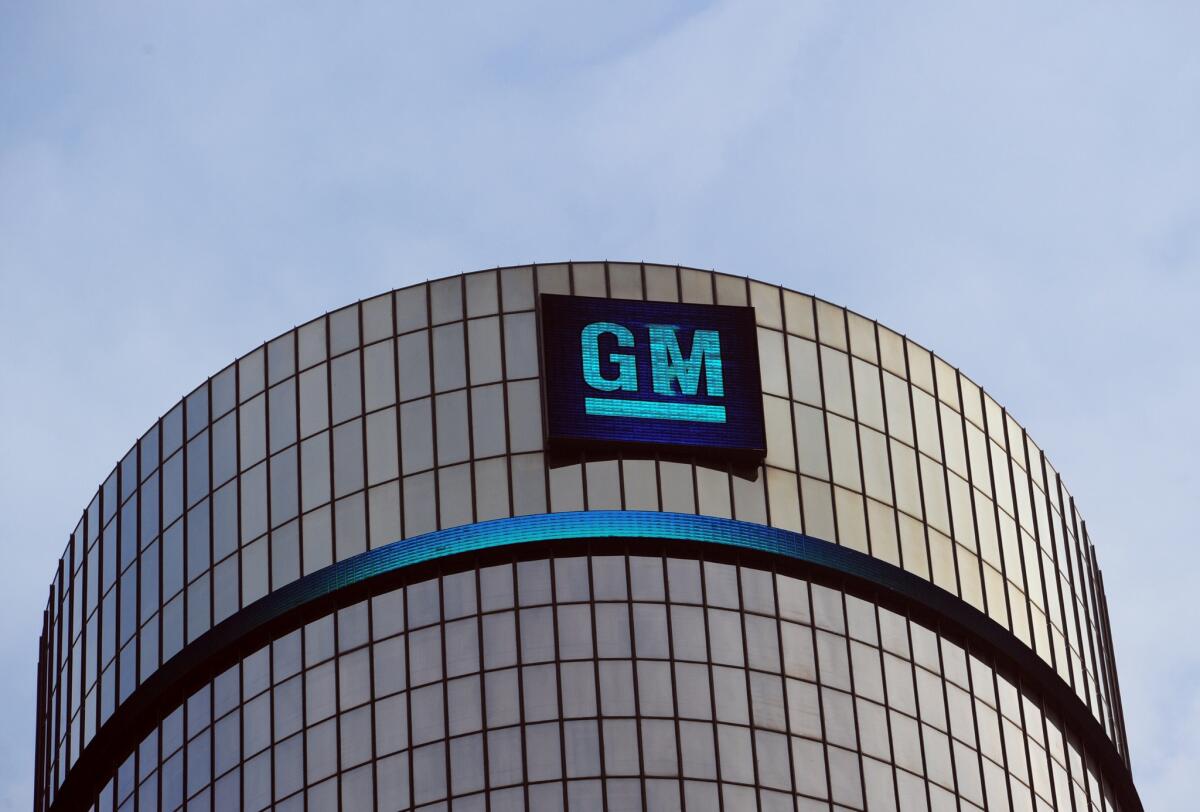Prosecutors, not regulators, are the new enforcers of automotive safety

Under its deal with the U.S. Department of Justice, GM will pay a fine of around $900 million to settle a federal criminal investigation into why it failed to recall millions of vehicles with a faulty ignition switch that led to hundreds of deaths and injuries. Above, GM headquarters in Detroit.
General Motors’ agreement Thursday to pay a $900-million fine for failing to recall defective cars illustrates the new playbook for holding automakers accountable for safety.
Traditional regulators have outsourced the heavy lifting to federal prosecutors, who brandish criminal charges as leverage to exact huge financial judgments from some of the world’s richest companies.
Such settlements allow companies such as GM and Toyota, which last year agreed to a record $1.2-billion fine, to avoid the threat of prosecution and jail for executives and to end invasive probes into the gory details of their negligence.
As with the Toyota case, regulators and prosecutors talked tough in announcing the GM settlement Thursday. They accused the company of covering up problems that killed and injured hundreds of customers. But the condemnations came without names and with limited narrative detail.
The Department of Justice, for instance, noted that “certain supervisors and attorneys at the company,” in highly placed positions, had early knowledge of deadly defects with GM ignition switches, which caused crashes by suddenly shutting off moving vehicles. The supervisors chose to prioritize profits over safety, prosecutors alleged.
U.S. Transportation Secretary Anthony Foxx also issued a nameless rebuke of the negligence inside GM.
“General Motors not only failed to disclose this deadly defect,” he said Thursday, “it actively concealed the truth from the National Highway Traffic Safety Administration and the public. Today’s announcement sends a message to manufacturers: Deception and delay are unacceptable, and the price for engaging in such behavior is high.”
The price may be high in dollars, but it pales in comparison with the damage of automakers’ negligence to victims and their families, said Clarence Ditlow, executive director at the Center for Auto Safety.
“GM killed over 100 people by knowingly putting a defective ignition switch into over 1 million vehicles. Yet no one from GM went to jail or was even charged with criminal homicide,” he said.
GM Chief Executive Mary Barra has been contrite since the safety scandal erupted early last year, and she maintained that posture Thursday.
“The mistakes that led to the ignition switch recall should never have happened. We have apologized and we do so again today,” she said. “Our mission has been to take the difficult lessons from this experience and use them to improve our company.”
GM has admitted that it “failed to disclose” to regulators a “lethal safety defect” and that it “misled consumers about the safety of GM cars with the defect,” according to the agreement. The automaker also forfeited the ability to minimize its losses from the large fine by claiming it as a deductible expense on its taxes.
The agreement is similar to the Department of Justice deal with Toyota Motor Corp. last year, when the Japanese automaker admitted to deceiving regulators about deadly safety defects that allegedly caused unintended sudden-acceleration incidents. The $1.2-billion federal fine it paid set a record for any automaker.
Both GM and Toyota agreed to the imposition of independent safety monitors.
The financial penalties only have so much deterrent value for massive global automakers, Ditlow argues.
“This shows a weakness in the law, not a weakness in the facts,” he said. “GM killed innocent consumers. GM has paid millions of dollars to its lobbyists to keep criminal penalties out of the Vehicle Safety Act since 1966. Today, thanks to its lobbyists, GM officials walk off scot-free while its customers are 6 feet under.”
U.S. Sens. Richard Blumenthal (D-Conn.) and Edward J. Markey (D-Mass.) called the settlement “extremely disappointing” because it “fails to require adequate and explicit admission of criminal culpability from GM and individual criminal actions.”
Preet Bharara, the U.S. attorney for the Southern District of New York, said it would be challenging to find an individual at the automaker who could be charged with a crime.
“Criminal intent can be hard to prove,” he said. “It’s not always possible to bring a case.” The settlement agreement involves GM’s handling of about 2.6 million vehicles recalled for ignition switch failures last year. The faulty switch can suddenly shut down the vehicle, turning off crucial functions such as power steering and air bags.
GM concedes the defect has led to crashes causing at least 124 deaths and 275 injuries. The automaker is paying more than $600 million in settlements to those victims and their families from a special compensation fund set up to handle the claims.
Added to the federal fine, that brings GM’s total payments to more than $1.5 billion, a total that will continue to rise, Bharara said.
Also on Thursday, the automaker settled a shareholder class-action suit resulting from its switch problems and litigation involving 1,385 related civil lawsuits. It will post a $575-million charge in the third quarter to cover the cost of the shareholder lawsuit and the civil litigation settlement charges.
“Lives were taken and families were devastated, and there is no way to ever change that sad fact,” said Bob Hilliard, a Corpus Christi, Texas, attorney acting as the lead attorney for all personal injury and death cases caused by GM’s defective ignition switch.
GM still faces 370 injury and 84 death lawsuits related to the defect, Hilliard said. The first jury trial is scheduled to start in a New York courtroom in January.
The automaker knew about the ignition switch problem for more than a decade before starting to recall the cars.
GM engineers learned the switch was defective even before it went into production in 2002, Bharara said. Testing of a prototype showed that the mechanics of the switch fell below GM’s own internal specifications.
But Ray DeGiorgio, the engineer in charge of the part, approved its production anyway. Following an internal investigation last year, GM fired DeGiorgio and 14 other employees involved with either the switch’s design or how the problem was handled. Five more employees were disciplined.
By 2004 and 2005, GM discovered that customers had experienced sudden stalls and engine shut-offs caused by the switch and considered fixing the problem.
But it decided not to because of cost and other factors, investigators found. The company gave assurance that the defect did not pose a safety concern.
By the spring of 2012, GM was aware of several fatal incidents and serious injuries that occurred as a result of accidents in which the defective switch may have been a factor.
The company waited until February 2014 to first notify NHTSA and the public of the problem. Regulations require automakers to report safety defects within five days. By June of last year GM had fired 15 people.
Carl Tobias, a product liability expert at the University of Richmond law school, expects the Justice Department to take a similar approach in handling other high-profile automotive cases. Japanese air bag manufacturer Takata faces a probe of how it handled a recall that ultimately involved air bag inflators in 19.2 million vehicles from 11 automakers.
The Takata inflators can explode in a crash, a defect linked to at least eight deaths and more than 100 injuries.
But in all these cases, proving guilt of individual employees is much harder than tying blame to entire corporations, attorneys said.
“It is troubling,” Tobias said. “We saw this in the bank fraud and financial collapse. Individuals don’t go to jail.”
While corporations can be prosecuted criminally based on the “collective knowledge” of their workers, in order to charge individuals prosecutors must first find who was responsible and then prove that that person intended to violate the law.
“Just being the person in charge generally isn’t enough,” said James M. Cole, who as deputy attorney general oversaw many financial prosecutions until he left office in January.
Yet even fines approaching $1 billion have limited effect on massive companies, said Hilliard, the plaintiff’s attorney.
“Unless the law changes,” he said, “there is going to be no deterrent for the next car company who decides tomorrow to cut corners and kill customers.”
Times staff writer Timothy M. Phelps contributed to this report.







